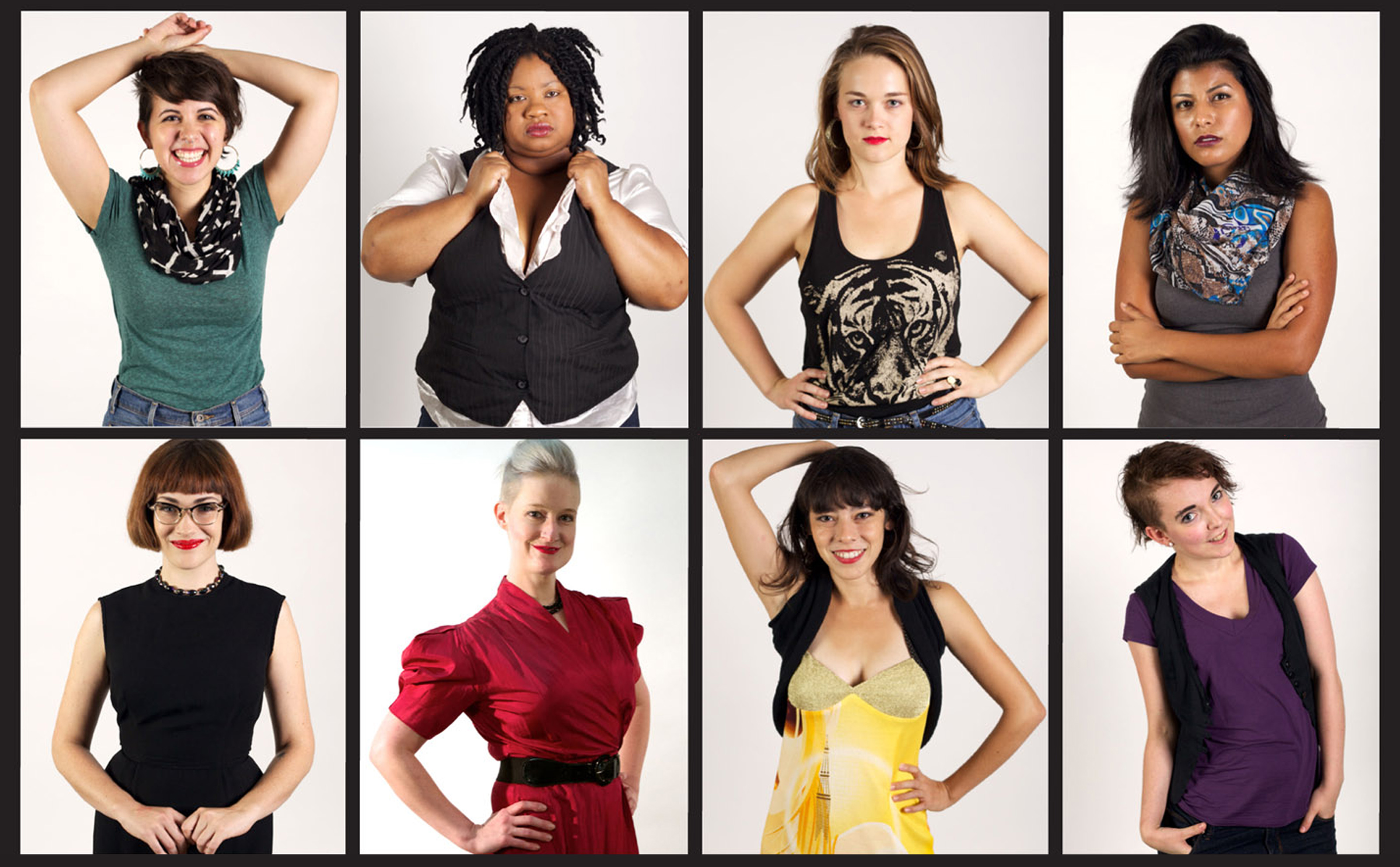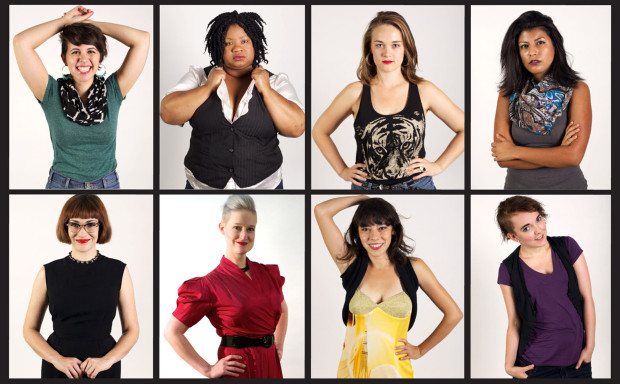
20% Theatre Company is a theatre company devoted to “vigorously promoting the work of female and transgender artists,” and the company has a really wonderful, rich history of producing and promoting work with queer elements beyond that. Femmes: A Tragedy by Gina Young is a great addition to this history.
Femmes: A Tragedy is a subversive take on the 1936 play The Women by Clare Luce Booth that highlights the pitfalls in relationships between heterosexual women when men get involved. Femmes spins this premise on its head by focusing on largely femme-butch relationships between women, and how that influences the friendships, alliances, and enemy-ships of queer femmes.
Set in the world of burlesque as our cast builds to a burlesque showcase called “Femme Fest,” the show centers around show director Marigold, her unseen butch girlfriend Dylan, and her rival for Dylan’s affection, Callie. This synopsis really doesn’t do the show justice, as Young also takes great effort to highlight important issues to communities of queer women, such as the intersection of race and sexual identity, ageism in queer and lesbian communities, how sexual harassment affects the psyche of queer women specifically, ethical non-monogamy versus less ethical versions, and of course the isolation and struggle most LGBTQIAP+ people face at some point as they balance who they are with the need to belong and be “queer enough.” This is all packed into just over two hours along with some lovely spoken word about being black and a lesbian, some top notch burlesque, and more than enough humor to offset the tragedy implied in the title.
Femmes is not a perfect play, although most issues are with the script itself. I am a long time fan of Gina Young, and where she shines in character development in this piece, she lacks somewhat in relationship building. A lot of alliances and new friendships are formed off-stage and just mentioned on stage, and there is a beautiful cast of characters who end up merely playing supporting roles to the main few players. This makes the constant shifting of who’s on who’s team a little hard to keep up with, and it left the audience wanting more from characters like Guerra (played by the endlessly charming Reyna Rios) and Dexy (played by Dana Lee Thompson, one of my favorite performers in the Twin Cities small theatre scene), who each have just enough meat to their story to reel us in, only to have their own struggles left unresolved. It is worth noting that director Claire Avitabile and this really top-notch cast do a stellar job of filling in those blanks for us, but nonetheless those blanks are there.
An element of the play I am still struggling with is that the two characters who do not identify as lesbian, but as non-monosexual in various degrees, are the ones presented to the audience as manipulative. This is a trope that is all too prevalent even in queer art and I am never a fan of it. Our minds do change about one of those characters, Callie (played by Jill Iverson). Iverson’s portrayal is filled with realistic insecurity and moments of pure heartbreak that eventually win our hearts as much as the other women’s struggles do. The other of these characters sees no such change, and I wish we saw just a few more moments of genuine emotion from them to substantiate that.
There are also a few things that die-hard theatre traditionalists may not love — some showy arm gestures, a lot of raised voices in heated moments, and a fair amount of didactic dialogue, for example. This show is not for these people though, and if queer art is as much about playing with convention on stage as it is questioning it off stage, these elements are important. The artists involved with this show clearly know the rules of performance, and any breaking of them is intentional.
In spite of those few notes, this play is incredibly important, beautifully performed, and has really flawless moments. Femmes‘ importance comes from not only the aforementioned tough topics presented in it, but because — as Guerra notes about femmes — “Though we aren’t represented in culture, we are shaped by it.” This thread of the show runs throughout as we see the societal pressure to look and act a certain way begin crushing the show’s main character, Marigold (played heartbreakingly realistically by Stephanie Messer), as her personal life falls apart. Marigold has a lifetime of feminist leanings fighting her own emotions, and the show is most successful in highlighting the moral ambiguity that comes with this struggle.
Point blank, this show matters because femmes matter, and they are all too often erased in conversations about identity in our community. I don’t know a single queer femme, myself included, who hasn’t asked at least once, “Do I look queer enough?” before heading into a queer space, because that pressure is real. There were moments I was choking back the tears that come with seeing elements of my own story being represented for the first time. More importantly however, there were two black femmes sitting beside me for this show. While I admit I wanted more from Thompson’s Dexy, what was there was great, and as the show progressed, the women beside me were cheering and getting really emotional nearly every time Thompson (who also hilariously played a bar staffer mocking the dramatic break-up between Marigold and Dylan) took the stage. I don’t want to assume too much about their life, but given their visceral reaction to these characters, I would venture they’re not very used to seeing themselves on stage either, and watching their emotional journey told me most of what I needed to know about this show.
To call this show beautifully performed is an understatement. Every performance is of note, and the show’s structure allows each actor to shine at various times. Morgan Cheng’s Riot would be easy to play for laughs, but instead we laugh with her when appropriate and identify with her struggle to truly let others in. Briana Patnode’s Libby could have gotten overshadowed by the rest of the ensemble, but due to Patnode’s own love of that character — and great character work — made Libby a crucial part of every scene she was in. Briana Zora Libby’s portrayal of Courtney kept us guessing the whole time, and her surprise ending had just the right amount of hint and build throughout the show. Amanda Hofman-Frethem as Dutch, a 40 year old burlesque performer who claims to have seen it all frequently mirrors our own reactions at any given time, and commands the stage anytime she is on it. Several of the performers are double or triple cast, and every character manages to be different and either intriguing or hilarious.
There are too many flawless moments to mention them all, but both Dexy’s poem about being black and femme and Marigold’s burlesque piece in which three butches bully her into de-femmeing in the name of queerness, only for her to turn around reclaim her identity and the word queer, almost brought me to my feet with wild applause though the show was still going on. Though Guerra soon gives into the pressure on women to gossip about each other, the genuine moments exploring her and Marigold’s friendship are so heartfelt they make you want to run and hug your own best friend.
The tragedy of Femmes goes back to that line of Guerra’s that haunts me: “Though we’re not represented in culture, we are shaped by it.” Femmes grow up watching girls behaving badly, being villainized and callous to each other, and like most women in our society are trying to shake that coding off while navigating the ever complicated world of dating, identity, and friendship. We don’t always succeed, and that is where the tragedy lies. Femmes does not leave us shattered as many tragedies do though. It is easy to chalk these relationships up to friendships, but if you are a queer person, you likely read more of a sense of chosen family into them, and families fight. They get furious and they threaten to walk out and move on, but when it’s a family bonded in love, community, and shared experience, they’re going to work it out. This is the feeling Femmes: A Tragedy ultimately left me with: we need to talk and fight and yell through the problems in our communities. We also need our communities, and know they are there for us.
Details
Dates: December 7 – December 13
Location: nimbus theatre, 1517 Central Ave NE, Minneapolis, Minnesota 55413
Tickets: Brown Paper Tickets

[…] this week Cassandra Snow reviews Femmes: A Tragedy, for The Column. While it sounds like a performance at 20% Theatre Company worth seeing, it’s not without […]
Comments are closed.